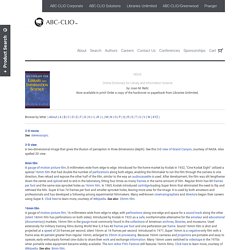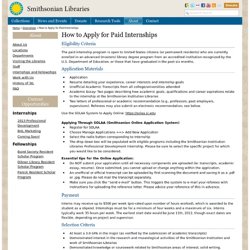

LIS 520 Searching. Culminating Experience. Research And Statistics About Libraries. The Home of Lauren Mandilian. iSchool. HIST 590. LIS 570. ODLIS — Online Dictionary for Library and Information Science. In classification, one of the distinguishing characteristics of a class, identified as a means of differentiating it from other classes.

As defined in FRBR (Functional Requirements for Bibliographic Records), one of a set of characteristics enabling users of information to formulate queries and evaluate responses when searching for information about a specific entity. Attributes can be inherent in the entity (physical characteristics, labeling information, etc.) or supplied by an external agent (assigned identifiers, contextual information, etc.). An E-Zine for Librarians and Information Junkies. Smithsonian Libraries :Internship Opportunities.
Eligibility Criteria The paid internship program is open to United States citizens (or permanent residents) who are currently enrolled in an advanced (masters) library degree program from an accredited institution recognized by the U.S.

Department of Education, or those that have graduated in the past six months.
Knowledge Management. Reader's Advisory. MLIS Curriculum. The MLIS program is 63-quarter credits, consisting of three elements: core courses, electives, and a final degree project.

Program requirements are the same for students in the residential MLIS and online MLIS programs. Law MLIS students should refer to their specific requirements, which differ. The MLIS curriculum is grounded in a set of core courses which are designed to give you a broad and solid foundation in important aspects of the library and information science field. Our world-class and diverse faculty has established this core curriculum to provide a conceptual and theoretical base of knowledge on how information is organized, stored, searched, and used, along with important technological, policy, pedagogical, research, management, and design concepts.